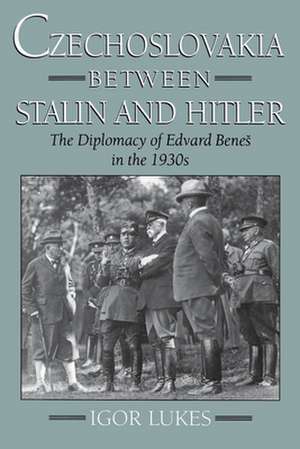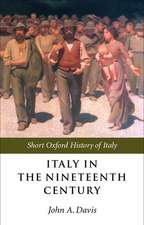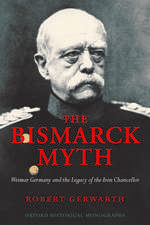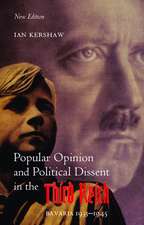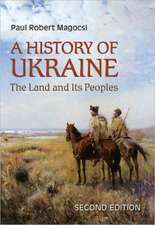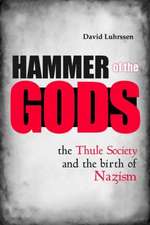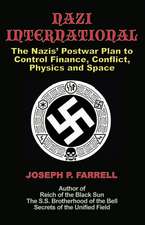Czechoslovakia between Stalin and Hitler: The Diplomacy of Edvard Benes in the 1930s
Autor Igor Lukesen Limba Engleză Paperback – 12 sep 1996
| Toate formatele și edițiile | Preț | Express |
|---|---|---|
| Paperback (1) | 586.05 lei 31-37 zile | |
| Oxford University Press – 12 sep 1996 | 586.05 lei 31-37 zile | |
| Hardback (1) | 1170.07 lei 31-37 zile | |
| Oxford University Press – 12 sep 1996 | 1170.07 lei 31-37 zile |
Preț: 586.05 lei
Preț vechi: 841.21 lei
-30% Nou
Puncte Express: 879
Preț estimativ în valută:
112.14€ • 117.40$ • 92.79£
112.14€ • 117.40$ • 92.79£
Carte tipărită la comandă
Livrare economică 26 martie-01 aprilie
Preluare comenzi: 021 569.72.76
Specificații
ISBN-13: 9780195102673
ISBN-10: 0195102673
Pagini: 352
Ilustrații: 16 pp halftones
Dimensiuni: 156 x 233 x 23 mm
Greutate: 0.48 kg
Editura: Oxford University Press
Colecția OUP USA
Locul publicării:New York, United States
ISBN-10: 0195102673
Pagini: 352
Ilustrații: 16 pp halftones
Dimensiuni: 156 x 233 x 23 mm
Greutate: 0.48 kg
Editura: Oxford University Press
Colecția OUP USA
Locul publicării:New York, United States
Recenzii
Professor Lukes' book is one of the most important and interesting studies of the events which led to W.W. II. His study of the Czechoslovak crisis of 1938 is bolstered by the hither-to secret documents released recently by Moscow and Prague. It throws an intriguing light on the Soviet Union's role in the crisis as well as a number of other important questions that could not be resolved by historians until now.
Mr. Lukes's treatise about the unfortunate country caught in the tongs handled by the two bloodiest dictators of Europe, brings to the story the fresh approach of an author unburdened with political affiliations or sympathies which often limit researchers of older generations.
This important study, based on hitherto inaccessible archival materials, seeks to reappraise Czechoslovak diplomacy in the late 1930s particularly toward the Soviet Union and Germany. It also offers a revisionist interpretation of soviet policies. In a fascinating presentation of crucial international events the author demolishes old cliches and exposes biased accounts; the book is not only a valuable contribution to history but is written in a way which retains the undivided attention of the reader.
This by far the best treatment of the topic and it is also one of the best monographs dealing with the diplomacy of any one of the small European states that were in the thirties sandwiched between Stalin's Russia and Hitler's Third Reich....Groundbreaking and exemplary.
A marvellous piece of work. Mercifully free of jargon and systems-speak, the book explores the foreign policy of the First Czechoslovak Republic from its creation in 1918 to its demise in 1938. The narrative focuses on the role of Foreign Minister Benes, but the book is really about the ways in which Czechoslovakia tried to survive in a terrible neighborhood, one that included not only the tyrants Hitler and Stalin, but avaricious smaller neighbors, like Poland and Hungary...Professor Lukes' book is one of the most important and interesting studies of the events which led to W.W. II. His study of the Czechoslovak crisis of 1938 is bolstered by the hither-to secret documents released recently by Moscow and Prague. It throws an intriguing light on the Soviet Union's role in the crisis as well as a number of other important questions that could not be resolved by historians until now.
Mr. Lukes's treatise about the unfortunate country caught in the tongs handled by the two bloodiest dictators of Europe, brings to the story the fresh approach of an author unburdened with political affiliations or sympathies which often limit researchers of older generations.
This important study, based on hitherto inaccessible archival materials, seeks to reappraise Czechoslovak diplomacy in the late 1930s particularly toward the Soviet Union and Germany. It also offers a revisionist interpretation of soviet policies. In a fascinating presentation of crucial international events the author demolishes old cliches and exposes biased accounts; the book is not only a valuable contribution to history but is written in a way which retains the undivided attention of the reader.
This by far the best treatment of the topic and it is also one of the best monographs dealing with the diplomacy of any one of the small European states that were in the thirties sandwiched between Stalin's Russia and Hitler's Third Reich....Groundbreaking and exemplary.
A marvellous piece of work. Mercifully free of jargon and systems-speak, the book explores the foreign policy of the First Czechoslovak Republic from its creation in 1918 to its demise in 1938. The narrative focuses on the role of Foreign Minister Benes, but the book is really about the ways in which Czechoslovakia tried to survive in a terrible neighborhood, one that included not only the tyrants Hitler and Stalin, but avaricious smaller neighbors, like Poland and Hungary...Professor Lukes' book is one of the most important and interesting studies of the events which led to W.W. II. His study of the Czechoslovak crisis of 1938 is bolstered by the hither-to secret documents released recently by Moscow and Prague. It throws an intriguing light on the Soviet Union's role in the crisis as well as a number of other important questions that could not be resolved by historians until now.
